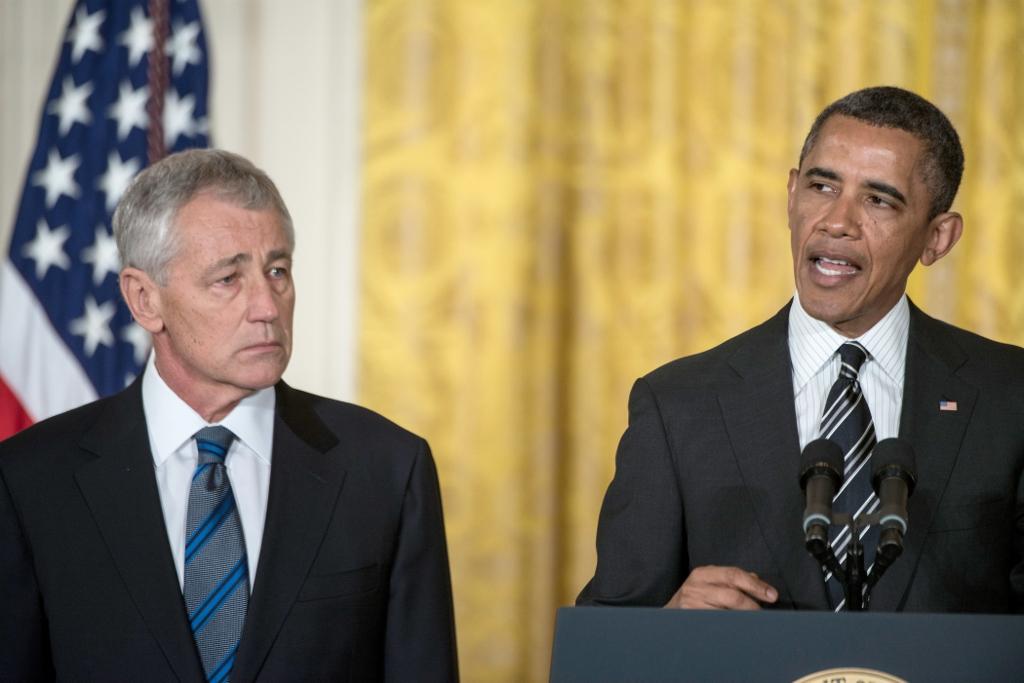Obama’s choice of Chuck Hagel and liberal posturing
President Barack Obama and Secretary of Defense nominee Chuck Hagel Jan. 7, 2013 in Washington D.C. Some view Hagel as a concession to the far right while others praise the selection of a moderate Republican.
RAMALLAH, West Bank — Most analysts have thus far portrayed President Obama’s choice of former Nebraska Senator Chuck Hagel as the country’s next secretary of defense as an uncharacteristic necessity, a means of appeasing and combating the rising American right in the same breath.
Appeasing because it’s clear that nominating a candidate from the same traditional liberal cloth as Obama would most likely lead to a crushing defeat in the confirmation vote. Combating because Hagel has earned himself a reputation as a critic of Israel and as an opponent of intervening in Iran.
In that sense, nominating Hagel has earned the president, who’s constantly under attack, some much needed respect that goes beyond the standard “reaching across isles” babble. This backwards logic, however, ought to be resisted.
Writing for Foreign Policy, Charlyne Berens, a journalism professor at the University of Nebraska, penned an idolizing portrait of Hagel suggesting that his experience with the horrors of war had created a frame of reference that would influence his policy decisions:
“By late 2004 he had tried to read everything he could find about Indochina, about the French involvement there before the Americans went in. He began to doubt his earlier faith in the American government’s motivations behind the war.”
The rationale here is that almost four decades later, after having himself gone to war voluntarily (he wasn’t initially stationed in Vietnam), Hagel qualifies as someone who “hates war,” as Berens writes, because he disavowed a horrific war that the overwhelming majority of the world either vehemently opposed from its beginnings or had long since denounced as unnecessary and unjust.
Many analyses follow suit in the same vein. Peter Feaver, professor of political science at Duke, writes in Foreign Policy, “a vote for Hagel may be a vote against the use of force in Iran.” Others, evoking earlier remarks Hagel made about the Israel lobby, think he may be able to make progress by approaching from a different angle the Middle East peace process, which Republicans have turned into a divisive issue since Obama’s 2008 election.
For someone who “hates war,” Hagel has done a poor job of showing it. After the Sept. 11, 2001, attacks, he voted in favor of Senate Joint Resolution 23, which authorized “necessary and appropriate US military force” against an already politically devastated and economically dilapidated Afghanistan. As recently as November 2012, at least 2,030 American troops had died from this disastrous intervention. According to costsofwar.org, “By a conservative estimate, 15,500 Afghan civilians have been killed.”
On Oct. 11, 2002, Hagel voted in favor of the Iraq Resolution, approving one of the United States’ most self-interested, shameful and unnecessary uses of imperial force, and triggering a bloody sectarian civil war that today continues in ebbs and flows despite the departure of US armed forces. Iraqis continue to bear the consequences of war, which Hagel supported. In a telling acknowledgement of this error, he later rhetorically remarked, “How many of us really know and understand Iraq, the country, the history, the people, the role in the Arab world?”
Furthermore, as the historian and activist Allen Ruff points out at The Progressive, Hagel sits on Chevron’s board of directors, and has a history of supporting policies that ostensibly support the petroleum giant’s interests.
Throw in a few homophobic remarks and a vote for the pervasive Patriot Act, and you have more or less summed up Obama’s choice for secretary of defense.
Hagel’s appointment is indicative of a disturbing trend in American politics. “Liberals,” those slightly more socially open Republicans that call themselves Democrats, sacrifice many of their demands even before they get to the negotiating table as their GOP counterparts continue to drift further right. Still, it would be inaccurate to portray Obama and company as well-meaning defenders of human rights who are "tragically beholden to bellicose Republicans.”
In any case, how much should we really expect from Obama, who oversees a drone program that has a roughly 34 percent civilian fatality rate and, by the final year of his first presidential term, had killed around six times as many people on the Afghanistan-Pakistan border as George W. Bush did in two presidential terms? Elsewhere, among those killed by Obama’s morally indefensible drones were at least three American civilians, including a 16-year-old boy. No one has been charged with a crime in connection with these killings.
By choosing Chuck Hagel as secretary of defense, Barack Obama was not acting as a noble politician capable of working across partisan divides. Nor was he executing an unfortunate though pragmatic necessity born from a tense political climate. Rather, such an unacceptable choice is part and parcel of his entire presidential record: four years of providing lip service to the marginally left of center and delivering results to the hard right.
Patrick O. Strickland is the Israel-Palestine Editor for BikyaNews.com. His writing has been published at Al-Akhbar English, Socialistworker.org, Aslan Media, Palestine Note, Fair Observer, and elsewhere.
Every day, reporters and producers at The World are hard at work bringing you human-centered news from across the globe. But we can’t do it without you. We need your support to ensure we can continue this work for another year.
Make a gift today, and you’ll help us unlock a matching gift of $67,000!
